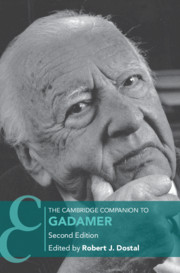Book contents
- The Cambridge Companion to Gadamer
- Other Volumes in the Series of Cambridge Companions
- The Cambridge Companion to Gadamer
- Copyright page
- Contents
- Contributors
- Abbreviations
- Introduction
- 1 Gadamer (1900–2002)
- 2 Gadamer’s Basic Understanding of Understanding
- 3 Getting It Right
- 4 Philosophical Hermeneutics, Language, and the Communicative Event
- 5 Phronesis and Solidarity
- 6 Gadamer’s Herderian Critics
- 7 Gadamer on the Human Sciences
- 8 Art Experience and Its Transformative Potential in Gadamer’s Hermeneutics
- 9 Lyric as Paradigm
- 10 Gadamer, the Hermeneutic Revolution, and Theology
- 11 Hermeneutics in Practice
- 12 Gadamer’s Hegel
- 13 Gadamer’s Relation to Heidegger and to Phenomenology
- 14 The Constellation of Hermeneutics, Critical Theory, and Deconstruction
- 15 Hermeneutics in a Broader Horizon
- Bibliography
- Index
- Other Volumes in the Series of Cambridge Companions (continued from page ii)
15 - Hermeneutics in a Broader Horizon
Gadamer, Rorty, Davidson
Published online by Cambridge University Press: 29 July 2021
- The Cambridge Companion to Gadamer
- Other Volumes in the Series of Cambridge Companions
- The Cambridge Companion to Gadamer
- Copyright page
- Contents
- Contributors
- Abbreviations
- Introduction
- 1 Gadamer (1900–2002)
- 2 Gadamer’s Basic Understanding of Understanding
- 3 Getting It Right
- 4 Philosophical Hermeneutics, Language, and the Communicative Event
- 5 Phronesis and Solidarity
- 6 Gadamer’s Herderian Critics
- 7 Gadamer on the Human Sciences
- 8 Art Experience and Its Transformative Potential in Gadamer’s Hermeneutics
- 9 Lyric as Paradigm
- 10 Gadamer, the Hermeneutic Revolution, and Theology
- 11 Hermeneutics in Practice
- 12 Gadamer’s Hegel
- 13 Gadamer’s Relation to Heidegger and to Phenomenology
- 14 The Constellation of Hermeneutics, Critical Theory, and Deconstruction
- 15 Hermeneutics in a Broader Horizon
- Bibliography
- Index
- Other Volumes in the Series of Cambridge Companions (continued from page ii)
Summary
This chapter explores how Gadamer’s hermeneutics has influenced important strands of contemporary philosophy and has converged with other philosophical school of thought. Mostly importantly, this chapter considers the relation of Gadamer’s thought to the thought of Rorty and Davidson. Rorty is influenced by Gadamer. Davidson shows no direct influence but is a case of overlap and convergence. Rorty aims to show the internal exhaustion of the twentieth–century epistemological–psychological tradition. He uses criticisms from within that tradition, including Gadamer. Philosophy is seen by Rorty, much like Gadamer, to a matter of joining a conversation. Rorty’s importation of Gadamer’s hermeneutic model is not without is difficulties. Rorty embraces incommensurability and Gadamer rejects it. Gadamer attempts an ontology and Rorty rejects ontology. Rorty cites Gadamer. Davidson never does and shows no signs of being influenced by Gadamer. Yet there some remarkable convergences. Davidson’s principle of charity and the communality of understanding and interpreting align very well with Gadamer.
- Type
- Chapter
- Information
- The Cambridge Companion to Gadamer , pp. 374 - 405Publisher: Cambridge University PressPrint publication year: 2021
- 1
- Cited by

